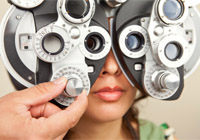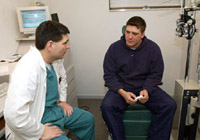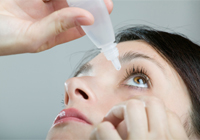Comprehensive Eye Care
 We provide comprehensive eye care to patients of all ages. Dr. Favero is fully trained and experienced to diagnose, treat and prevent conditions from myopia and hyperopia to glaucoma, cataracts and everything in between.
We provide comprehensive eye care to patients of all ages. Dr. Favero is fully trained and experienced to diagnose, treat and prevent conditions from myopia and hyperopia to glaucoma, cataracts and everything in between.
We strive to provide our patients with safe, minimally invasive treatments to effectively relieve symptoms and preserve vision and overall eye health. As a comprehensive ophthalmology practice, our services include not only laser vision correction and small-incision cataract surgery but also treatments for a range of conditions such as glaucoma, dry eye and macular degeneration.
Regular Eye Exams
 Regular eye exams are an invaluable tool in maintaining your eyes' health by detecting and preventing disease. Some diseases develop slowly without causing pain or vision loss. Early detection of any problems can reduce the risk of further harm and allow for a choice of treatment options. We regularly screen for diseases such as glaucoma and diabetic retinopathy, which can develop without any noticeable symptoms.
Regular eye exams are an invaluable tool in maintaining your eyes' health by detecting and preventing disease. Some diseases develop slowly without causing pain or vision loss. Early detection of any problems can reduce the risk of further harm and allow for a choice of treatment options. We regularly screen for diseases such as glaucoma and diabetic retinopathy, which can develop without any noticeable symptoms.
Patients should have a comprehensive eye exam every one to three years, depending on their age, risk of disease and overall physical condition. Children should have regular tests to ensure the proper development of their vision and prevent any interference with their academic achievements. Older adults are often at a higher risk for eye conditions such as glaucoma, macular degeneration and cataracts. Even if your eyes are healthy, you should still have a regular eye exam to detect any problems as soon as possible and begin necessary treatment.
Dry Eye Treatment
 Dry eye occurs when the eyes aren't sufficiently moisturized, leading to itching, redness and pain from dry spots on the surface of the eye. The eyes may become dry and irritated because the tear ducts don't produce enough tears, or because the tears themselves have a chemical imbalance.
Dry eye occurs when the eyes aren't sufficiently moisturized, leading to itching, redness and pain from dry spots on the surface of the eye. The eyes may become dry and irritated because the tear ducts don't produce enough tears, or because the tears themselves have a chemical imbalance.
People usually begin experiencing dry eye symptoms as they age, but the condition can also result from certain medications, conditions or injuries.
Dry eye is not only painful, it can also damage the eye's tissues and impair vision. Fortunately, many treatment options are available.
Non-surgical treatments for dry eye include blinking exercises, increasing humidity at home or work, and use of artificial tears or moisturizing ointment. If these methods fail, small punctal plugs may be inserted in the corners of the eyes to limit tear drainage, or the drainage tubes in the eyes may be surgically closed. Eyelid surgery is also a solution if an eyelid condition is causing your dry eyes.
Enucleation Surgery
Disease, trauma, blindness and eye pain may necessitate the removal of an eye, also called enucleation. Most patients who undergo the procedure are able to replace the enucleated eye with an orbital implant and a prosthesis (artificial eye). Orbital implants are attached to muscles and other structures in the eye socket, so they feel secure and patients retain the ability to move the artificial eye. The prosthesis is designed and placed about six weeks after orbital implantation. Prostheses are often made of porcelain, and look natural as they are custom-fit and colored to match the patient's other eye.
Diabetic Retinopathy
 Diabetic retinopathy is a complication of diabetes that weakens the blood vessels that supply nourishment to the retina (the light-sensitive lining in the back of the eye where vision is focused). These weak vessels can leak, swell or develop thin branches, causing a loss of vision. Changes to your vision may not be noticeable at first. But in its advanced stages, the disease can cause blurred or cloudy vision, floaters and blind spots – and, eventually, blindness. This damage is irreversible. Diabetic retinopathy is the most common diabetic eye complication and a leading cause of blindness in American adults. Macular edema, which is leaking fluid that causes blurred vision, often occurs with diabetic retinopathy.
Diabetic retinopathy is a complication of diabetes that weakens the blood vessels that supply nourishment to the retina (the light-sensitive lining in the back of the eye where vision is focused). These weak vessels can leak, swell or develop thin branches, causing a loss of vision. Changes to your vision may not be noticeable at first. But in its advanced stages, the disease can cause blurred or cloudy vision, floaters and blind spots – and, eventually, blindness. This damage is irreversible. Diabetic retinopathy is the most common diabetic eye complication and a leading cause of blindness in American adults. Macular edema, which is leaking fluid that causes blurred vision, often occurs with diabetic retinopathy.
Fortunately, diabetic retinopathy is preventable. People with diabetes are most susceptible to developing it, but your risk is reduced if you follow your prescribed diet and medications, exercise regularly, control your blood pressure, and avoid alcohol and cigarettes. Regular eye exams are an integral part of making sure your eyes are healthy. Diabetic retinopathy can be detected through a visual acuity test, a dilated eye exam or tonometry.
Although damage caused by diabetic retinopathy cannot be corrected, patients diagnosed with the condition can be treated to slow its progression and prevent further vision loss. Treatment modalities include laser and surgical procedures.
 For more info on our Comprehensive Eye Care services, call us to schedule an appointment 810-985-9600.
For more info on our Comprehensive Eye Care services, call us to schedule an appointment 810-985-9600.





